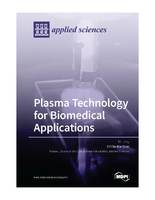Dublin Core
Title
Plasma Technology for Biomedical Applications
Subject
plasma, biomedicine, dentistry treatment
Description
The paper by Shahmohammadi Beni and co-workers [21] adds to the application for which the first
plasma medicine tool was originally designed [17], that is the use of a CAP to perform dental treatments in the oral cavity [22,23]. The authors have investigated numerically the transport by convection and diffusion of OH radicals and of hydrogen peroxide (H2O2) generated by CAP over treated teeth. This is important, as OH radical and hydrogen peroxide are two of the most important reactive species generated by the plasma, in terms of biological effects. The model used by the authors consists of an equation for the carrier gas motion, based on the level set method, that is a conceptual framework allowing to perform numerical computations involving curves and surfaces on a fixed Cartesian grid without having to parametrize these objects, and transport equations giving the evolution of the OH radical concentration and of the H2O2 concentration. The equations were solved in a realistic geometry model of the mandibular jaw and of the space between it and the plasma source. The simulation results allowed a realistic evaluation of the deposition of the two active species on the different teeth of the simulated jaw. Overall, apart from the scientific merit of the specific results, this code appears to be a valuable tool for carefully assessing the actual deposition of active chemical species (possibly including also other species) in a complex geometry, thus allowing to optimize the design of the plasma source, and could be possibly extended also to different environments and plasma treatments
plasma medicine tool was originally designed [17], that is the use of a CAP to perform dental treatments in the oral cavity [22,23]. The authors have investigated numerically the transport by convection and diffusion of OH radicals and of hydrogen peroxide (H2O2) generated by CAP over treated teeth. This is important, as OH radical and hydrogen peroxide are two of the most important reactive species generated by the plasma, in terms of biological effects. The model used by the authors consists of an equation for the carrier gas motion, based on the level set method, that is a conceptual framework allowing to perform numerical computations involving curves and surfaces on a fixed Cartesian grid without having to parametrize these objects, and transport equations giving the evolution of the OH radical concentration and of the H2O2 concentration. The equations were solved in a realistic geometry model of the mandibular jaw and of the space between it and the plasma source. The simulation results allowed a realistic evaluation of the deposition of the two active species on the different teeth of the simulated jaw. Overall, apart from the scientific merit of the specific results, this code appears to be a valuable tool for carefully assessing the actual deposition of active chemical species (possibly including also other species) in a complex geometry, thus allowing to optimize the design of the plasma source, and could be possibly extended also to different environments and plasma treatments
Creator
Emilio Martines (Ed.)
Source
https://www.mdpi.com/books/pdfview/book/2340
Publisher
MDPI - Multidisciplinary Digital Publishing Institute
Date
May 2020
Contributor
Dwi prihastuti, S.Sos
Rights
https://creativecommons.org/licenses/by/4.0/
Format
pdf
Language
English
Type
Textbooks
Identifier
ISBN 978-3-03928-737-6 (PDF)
https://doi.org/10.3390/books978-3-03928-737-6
https://doi.org/10.3390/books978-3-03928-737-6

